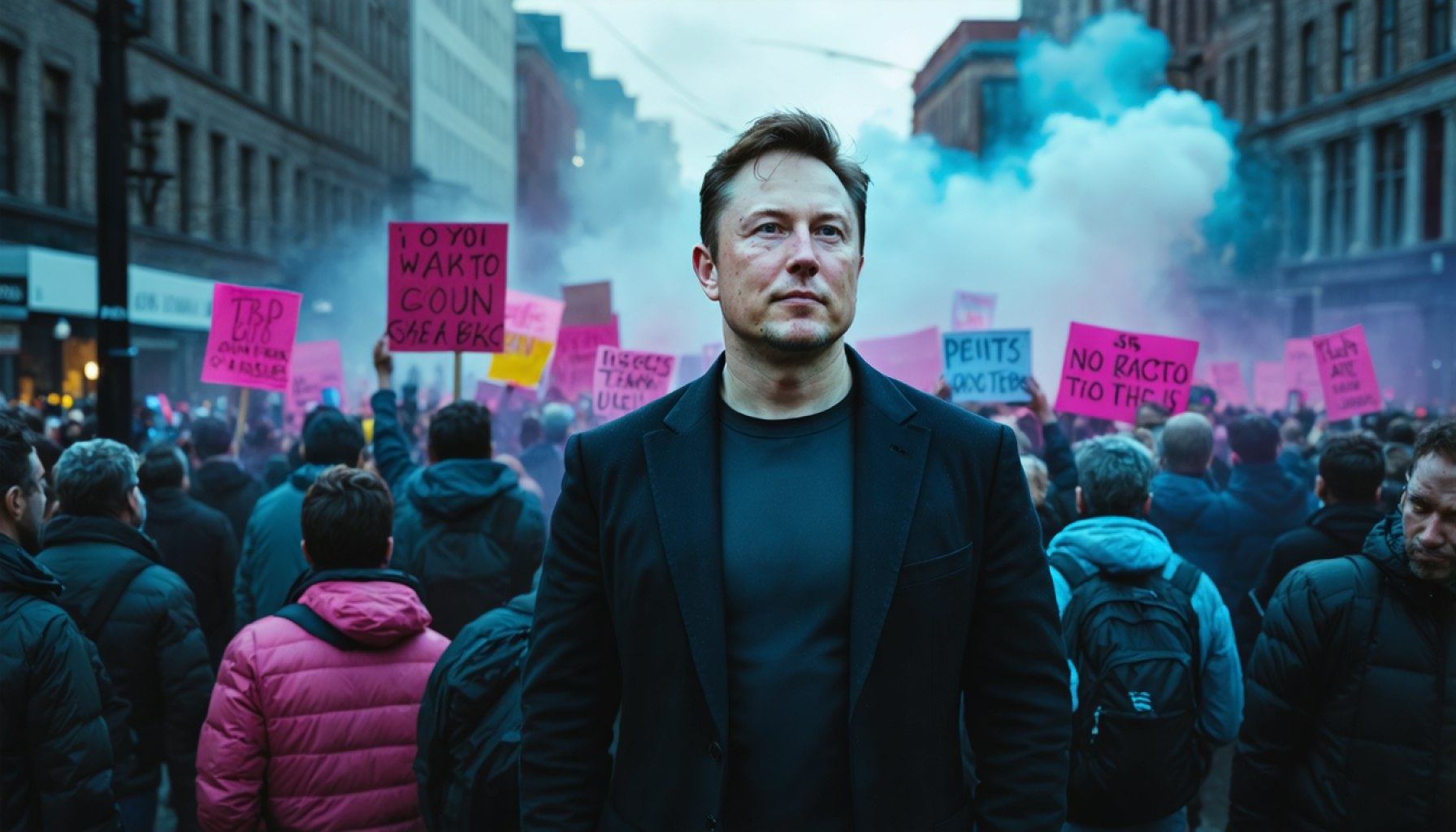- The “Tesla Takedown” movement unites global protesters against Elon Musk, targeting his influence and controversial governmental program cuts.
- Protests are concentrated in places like Golden Valley, Minnesota, aiming to send a powerful message by urging the sale of Tesla cars and stocks.
- Critics argue that Musk’s actions could undermine essential social safety nets, calling for accountability and ethical corporate behavior.
- The movement emphasizes the significant role of public opinion in holding corporate power accountable for socio-political impacts.
- The protests highlight a demand for a broader discussion about corporate responsibility, innovation, and the social contract’s future.
- The global community awaits Elon Musk and Tesla’s response to this challenge to reshape their narrative and societal influence.
A defiant wind sweeps across the globe as protesters unite under the banner of “Tesla Takedown.” This audacious movement targets none other than tech magnate Elon Musk, igniting a blaze of activism against his controversial cuts to vital government programs.
From the sprawling avenues of Golden Valley, Minnesota, to bustling Maplewood, and beyond, the protestors draw a stark line in the sand. Their message is resolute: dismantle your ties with Tesla. The air vibrates with calls to sell not just the cars but Tesla stocks themselves, severing financial support from Musk’s financial empire.
The epicenter of this global outcry sits in Golden Valley, where passionate individuals gather at the local Tesla dealership. As technology streams live footage of the protest across digital landscapes, it’s a vivid reminder of the power of grassroots movements in our hyper-connected era.
At the heart of these protests lies a deep-seated frustration over Elon Musk’s stance on governmental disbandment. Critics argue that these actions threaten to undermine the social safety nets and institutions that millions of citizens rely upon. Their protest is more than symbolic; it is a clarion call for accountability and societal stewardship.
Not merely about stock prices or sleek electric vehicles, the “Tesla Takedown” seeks to ignite a broader conversation. With placards hoisted high, protestors embody a growing sentiment that corporate powerhouses must be held accountable for their socio-political impacts.
As voices echo around the world, the key takeaway emerges with clarity: influence matters, and public opinion wields significant power. The protestors’ fervent calls for change signal a poignant shift in the narrative surrounding corporate responsibility and civic duty.
Through this unfolding saga, one question persists—how will Elon Musk and Tesla respond to a movement determined to reshape the conversation around technology, innovation, and the social contract? The world watches, listening closely for the answer.
Global Protests Against Tesla: A Turning Point for Corporate Responsibility?
Introduction
In a significant global movement dubbed the “Tesla Takedown,” protesters are uniting to challenge tech magnate Elon Musk over his controversial decisions impacting vital government programs. Originating from areas like Golden Valley, Minnesota, these demonstrations call for individuals to divest from Tesla, both from a consumer and financial standpoint. This movement signifies a broader challenge to the responsibilities and influences of corporate giants.
Why is Elon Musk Under Fire?
The core of this protest is Musk’s alleged actions threatening government institutions and social safety nets. Critics view these cuts as potential risks to the welfare of millions depending on government-supported programs. The protesters advocate for accountability and responsible stewardship from influential corporations like Tesla.
The Power and Influence of Grassroots Movements
Grassroots movements like the “Tesla Takedown” highlight how interconnected our world has become. As live streams from protests circulate widely, supporters and onlookers around the globe are drawn into the conversation, emphasizing the potential impact of public opinion in corporate governance.
Real-World Use Cases: Tesla’s Impact Beyond Cars
– Environmental Concerns: Tesla’s electric vehicles (EVs) are often lauded for their role in reducing carbon emissions. However, researchers argue that it’s essential to consider the entire production cycle, including battery manufacturing, which can be resource-intensive.
– Job Market Alterations: As Tesla expands, it pushes traditional car manufacturers to innovate, sometimes leading to job restructuring or layoffs in the automotive industry.
Industry Trends: Sustainability and Accountability
The protests align with a growing trend towards demanding sustainable and socially responsible practices from corporations. Investors and consumers alike are showing increased interest in companies that demonstrate ethical behaviors, pushing the market toward more eco-friendly and socially conscious business practices.
Understanding the Economics: Tesla’s Market Influence
Despite these protests, Tesla remains a formidable force in the stock market. Understanding Tesla’s financial structure and stock performance helps investors make informed decisions about their involvement with the company. NASDAQ offers insight into stock trends that reflect on investor sentiment and market predictions.
Pros & Cons of Tesla’s Business Model
Pros:
– Technological Innovation: Tesla leads in automotive innovation with impressive EVs and autonomous driving capabilities.
– Brand Value: Strong brand reputation and customer loyalty.
Cons:
– Controversial Leadership: Elon Musk’s leadership style and decisions often attract public scrutiny.
– Regulatory Challenges: Operating in highly regulated industries like automotive and energy can lead to potential hurdles.
How-to Manage Investments During Corporate Unrest
For those invested in Tesla, it’s crucial to consider diversification to shield from potential volatility due to sociopolitical movements. Keeping a balanced portfolio, integrating ESG (Environmental, Social, and Governance)-centric stocks, and staying informed via reputable stock analysis platforms can be strategic. MarketWatch provides valuable market insights and assessments.
Conclusion and Recommendations
The “Tesla Takedown” is more than just another protest; it is a catalyst for global discourse on corporate responsibility and ethical practice. Observers and investors must remain informed, diligent, and proactive. Here are quick actionable tips:
– Educate Yourself: Stay updated on corporate behaviors and potential impacts on societal well-being.
– Engage in the Conversation: Participate in dialogues supporting accountable business practices.
– Review Investments: Regularly reassess your investment portfolio for ethical alignment and market stability.
Ultimately, as the world monitors this unfolding situation, the expectation remains clear—principles of accountability and societal welfare should guide corporate actions more than ever before.
